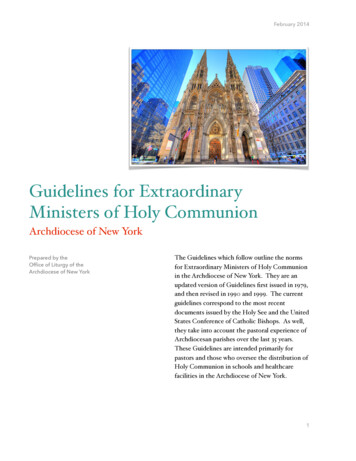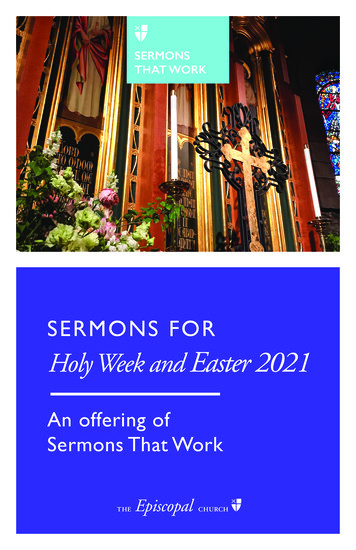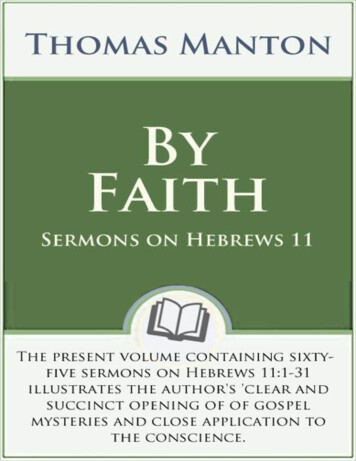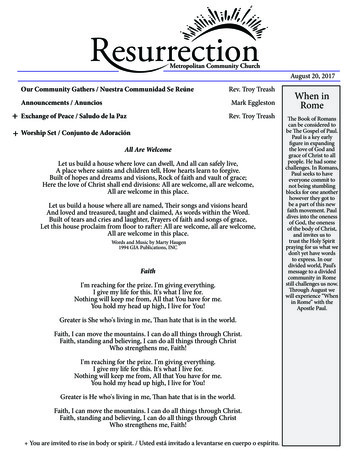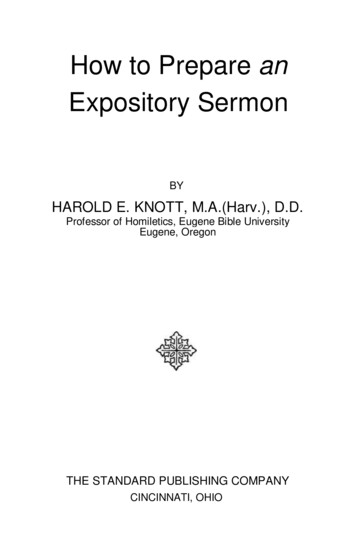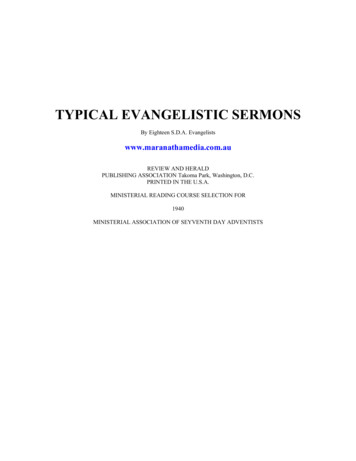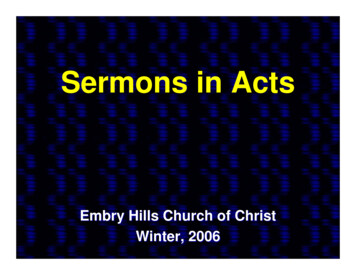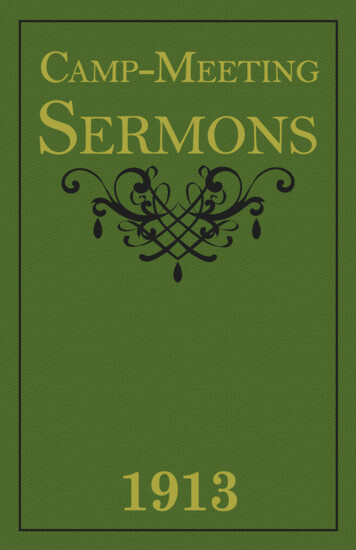
Transcription
Fourteen Communion SermonsBy Samuel RutherfordWITH APREFACE AND NOTESBY REV. ANDREW A. BONAR, D.D.Table of ContentsPREFACESERMON I.—Revelation 19:11, 12, 13, 14SERMON II.—Zechariah 13:7, 8, 9SERMON III.—Zechariah 13:7, 8, 9SERMON IV.—Luke 14:16, 17, &c.SERMON V.—Hebrews 12:1, 2, 3, 4, 5SERMON VI.—Isaiah 49:1, 2, 3, 4SERMON VII.—Zechariah 11:9, 10, 11, 12, 13SERMON VIII.—John 20:13, 14, 15, 16, 17, 18SERMON IX.—Song of Solomon 5:1, 2, &c.SERMON X.—Revelation 21:4, 5, 6, 7
SERMON XI.—Canticles 2:14, 17ADDRESS XII.—Christ's Love and LovelinessSERMON XIII.—Revelation 14:7, 8, 9, 10, 11, &c.PREFACEALL who relish "Samuel Rutherford's Letters" will welcome the reprint ofthis volume, entitled, when first printed, "Collection of Valuable SermonsPreached by him at Sacramental Occasions, in the years 1630, 1634, and1637." I have added two discourses to the collection, one preached in1630, and another in 1633, and also what is commonly called aCommunion Address, delivered in London.All breathe the same spirit as the famous "Letters," and are full of racyremark and illustration, bearing on scriptural doctrine and Christianexperience.The Sermons were not published by himself, but from the notes ofhearers, and so there are some awkward sentences and clauses. But stillthey are exceedingly valuable. The first nine sermons were originallyprinted at Glasgow, "from an old manuscript." The rest have frequentlyappeared in various forms. A Sermon, which bears the title, "The CruelWatchman," and a fragment, "Christ's Voice from Heaven," are notgenuine, and so are not included in this collection. His only otherSermons are that on Luke 8:22, preached before the House of Commons,1644, and that on Daniel 6:26, preached before the House of Lords, 1645.ANDREW A. BONAR.GLASGOW, 1876.
PREFACE TO THE SECOND EDITIONTHE first issue of two thousand copies has been sold off within a year. Inthe meantime, two more of S. Rutherford's Sacramental Sermons havebeen sent to the Editor by friends who had them in their possession, andwere happy to offer this addition to the First Twelve. They are given inthis volume.ANDREW A. BONAR.GLASGOW, 1877.
COMMUNION SERMONSSERMON I.—Revelation 19:11, 12, 13, 14And I saw heaven opened, and behold a white horse; and he that satupon him was called Faithful and True, and in righteousness he dothjudge and make war, &c.—Revelation 19:11, 12, 13, 14.CHRIST is here brought in triumphing on horseback, and His armiesfollowing Him upon white horses. Here Christ is discovered gloriously: 1.From His triumph, on horseback. 2. From His style, Faithful and True. 3.From His righteousness in government. 4. From His head, His eyes, Hisname, His habit, His convoy, His power of the sword, and His high style.KING OF KINGS, &c., which are all here set down.Before ever John see this triumph of Christ over Antichrist, he sees"Heaven opened," which shews him a new revelation. For, until God openthe door, and glance† from heaven with new light, we never do certainlybelieve that Christ shall win the battle. If God's door be closed, and oureyes be darkened, we think we see Christ going on foot, persecuted andbanished, and put to the worse; then we begin to droop and die, and castaway our confidence, as Elias did. But we have faith and hope when awindow is opened in heaven to give us light, but until then, no marvel thesaints have their faith to seek. David said, One day or other, I shall fall bythe hand of Saul; and yet he had that promise, that he should live and beking. He had then many experiences; how comes this then, that he was inthe dark? Here is a reason; God had closed the door. We think no more ofour trouble, but at first* by faith and hope to open our King's door, and into Him, and be stayed with flagons, and comforted with apples. No, butGod will cause His children to come and stand, and pant, and cry, andwait upon an open door. And yet they are believing though they know itnot, they are waiting on for faith though they know it not; and howbeitthey think they believe not, yet that is believing to one of His children.And therefore howbeit our Lord keep a good house, His children will getleave to sleep and mourn twenty-four hours for bread. God loves a hungry
child that's aye crying for bread. Nay, I say it is more glory to God, toknock a while at a locked door, than if the door were open to us night andday. We see not that hunger is often better for us than a full stomach. Inhunger we seek and cry, and it pleases God; but when we are full, we canlay ourselves down in the sun and fall asleep."And behold a white horse; and he that sat upon him was called Faithfuland True."—Here we have a glorious description of Christ; as also in Song3:10; Col. 1:15, 16, 17; Rev. 3:14. And wherefore is all this? I think it is aputting Christ to open market, a commending of Him as highly worth thebuying. What think ye of Him? Well, is He not a lovely one, a sweetexcellent person? Saw ye ever the like of Him? (I will talk of this and theconvoy, and let you see both together). Where is Christ? He is triumphingupon a white horse, and the saints, His armies at His back, following Himon horseback in white. Here indeed is a fair company of horsemen, all inwhite! Here all are in one livery; Christ is the Captain or Colonel, and allHis company, His armies with Him. Christ and all His Elect are a faircompany together, and a well-favoured sight. "And I looked, and lo, aLamb stood on the mount Zion, and with him an hundred forty and fourthousand, having his Father's name written in their foreheads" (Rev.14:1). "Behold, I and the children whom thou hast given me" (Isa. 8:18). Ithink he would say, Am not I and my children a pleasant sight? Judge yethen what a sight it will be at the last day, when Christ, having ended Hiscourt, and the saints have met Him in the air, He and they shall go backagain to heaven, and He shall come in at the door with such majesty, andall the first-born, the fair bairn-tene,* the whole Elect, nations, tongues,languages and people, that none can number, at His back, every one ofthem as fair as the sun! And He shall present them as a gift to the Father."After this I beheld, and, lo, a great multitude, which no man couldnumber, of all nations, and kindreds, and people, and tongues, stoodbefore the throne, and before the Lamb, clothed with white robes, andpalms in their hands" (Rev. 7:9). In very deed, then, he is a happy manwho is amongst them; for that must be a glad meeting for evermore,when we shall meet with the Bridegroom. This white horse that Christrides on, teaches nothing else than that He triumphs in Himself, and Hiscause and truth. He rode through death and hell, and was never thrownoff the saddle. Nay, upon the cross, "having spoiled principalities and
powers, He made a show of them openly, triumphing over them in it"(Col. 2:15). "I am He that liveth, and was dead; and, behold, I am alive forevermore, Amen; and have the keys of hell and of death" (Rev. 1:18). Hereis Christ riding over hell and death upon His triumphant horse, andbreaking the wards, and taking the keys of the prison with Him. And isHe not daily posting upon this horse? Has He not ridden like a victoriousLord through Germany, and sparkled dirt upon the Beast's face, and thefalse Prophet? Ye will say, Christ loseth a battle sometimes. I grant you,Christ's horse seems to snapper* sometimes, and is upon his knees, buthe doth not fall. Nay, even when the woman is chased, by the Dragon, tothe wilderness, Christ keeps the saddle and bridle; the devil cannot layHim on the breadth of His back, and take His horse from Him. The horseseemed to lose a stroke in a mire, when Christ cried, "My God, my God,why hast thou forsaken me?" and when the Kirk was in captivity, at theriver of Babel, weeping like a poor silly captive. But believe me, Christ willwin the race, and will get the gold,† and we shall get a part of it. Christ inHis members will get a fall, but He will rise again and win the field, say allwhat ye will. He will yet ride in Scotland, and win the race. Ken ye whatHe said? (2 Cor. 4:9), "Persecuted, but not forsaken; cast down, but notdestroyed.""Faithful and True."—So is He called the Faithful and True witness, theAmen, who spake the truth betwixt God and us, and told us all that everHe heard of the Father. And these styles the Lord Jesus gets because allthe promises of God, made to us, are fastened to Christ, as so many bondsthat God has given us in the gospel. Says Christ, "He that believeth onMe, is passed from death to life;—he that loveth Me, shall be loved of MyFather; and we will come into him, and make our abode with him;—hethat overcometh, shall eat of the tree of life." Christ's name is in all thebonds, in all the bargains betwixt God and us. Christ is aye one, and He isa Cautioner, not only for us but with us; for God challenged Him for ourdebt, and He, as Faithful and True, answered without bout-gates,* andwas very honest in His word to His Father. He is (let me speak so) God'sCautioner to us, taking on Him that God shall keep true to us. This is apoint not considered as it should be by us; for there is not a promisemade to the true believer, but he may challenge Christ for it by law;though it is the law of the new Covenant. But in this good sense, Christ is
God's debtor, and He is become our debtor. Indeed Christ is fastened inthe Mediator's chair and offices, with strong nails and iron wedges, onboth sides: God hath bound Him by law. "For the Lord God will help me;therefore shall I not be confounded; therefore have I set my face like aflint, and I know that I shall not be ashamed" (Isaiah 50:7). There Christsays, I am bound, but I hope I shall not die in my bonds: I shall be trueboth to God and man: I hope I shall have no shame of my handy-works.Then we are far in the wrong to Christ, when we believe not. Nay, ye sayye dare not yet believe. Ye say ye are aye doubting. Ken ye what ye say,when ye say that? Ye are even saying, I fear Christ play me a slip: I fearChrist be but a false promiser. I say it is wrong to believe a falsehood ofan honest man; for, thou that wilt not believe the promises, thou artsaying the Lord Jesus Christ is but a double* dyvour: "He that believethnot God, hath made Him a liar" (1 John 5:10). Now when the text saysChrist is Faithful and True, this is the King's broad seal for your salvation;and aye the truer Christ be, it is the better for you. For when in judgmentyour salvation is questioned, and your sins come in† reckoning, whetherthey be satisfied for, or not, ye may see an easy way. Say ye, Lord, ask atChrist, the faithful witness, if they be not taken away. Christ is one of thesworn men (if we may so speak) upon His conscience for clearing of you,and He is Faithful and True, and will tell the truth. And will Christ get itdenied, what scourges, whips, and strokes, He suffered for you? Nay,indeed we have gotten, I think, a strong hold of salvation, when we havegotten it laid over on Christ the Faithful and True. It is much that afaithful man is in office, and that he keeps all the writs in the country;and if he keeps the register who is faithful, true, and an honest witness,then all the writs and charters are safe. The writs you and I have forheaven, are all in Christ's hand, and ye should aye be looking them over."In righteousness He doth judge and make war."—He rendereth to everyman according to his works; but in battles amongst men, much blood isspilt, falsehood, and violence used, while those who may be strongest,whether it be right or not, keep the field. Nay in very deed, are notkingdoms often ruined by opposite parties, who rent them in piecesamongst them? As to Nebuchadnezzar's, the Medes, and Persians did.They draw it among them, and the thing they get is a fine web of linen, abit of a kingdom with an ill conscience, which never does them good.
They are like so many men striving about a leme* vessel; he draws, andhe draws, and the one pulls the side from the vessel, and breaks it inpieces: So conquerors, when they have subdued a kingdom, are like thosewho get the leme vessel, that seldom bides the second heir. Christ makesnot war with the shedding of innocent blood; when He takes in a city, Heplays not foul play as other captains do, where often the soldier's right toa country is by the point of the sword; for there is no difference betwixthis sword, his conscience, and his musket. But it is not so with Christ.How then? 1. When Christ takes in a city, nation or country, He has God'sright to it, and His Father's promise of it (Psalm 2:8; Psalm 72:8). "Heshall have dominion also from sea to sea, and from the river unto theends of the earth." 2. When besieged men render and give up themselvesto Christ, O! but they get good quarters from Him! They live and are notmade captives, but kings and priests to God. Christ's captives have aking's life of it. 3. Christ makes not war in a passion, but sweetly to Hispeople in the end, though seemingly bitter at the first. But when Christ'senemies who get the worse, are all driven to pieces with a rod of iron, theyhave no comfort; yet He hath done them no wrong, He hath made Hiswar in righteousness. Then ye who are His enemies shall never be curednor healed again, nor yet by Him pitied; nay, let Christ drive an enemy allto flinders, He doth it by laws God bade Him. Who will then gather themor mend them? Oh! there is no balm, no cure for the mending of Christ'swounds again. But there is sweetness, and comfort to those whom Christtakes in, and sets on to win them to the obedience of the gospel. He hasgood right to you, and has God's warrant to have you. Has Christ fought abattle with the devil and sin, and hath He won you? Then He hath betterright to you than you have to the coat on your back. Be glad ye are Hisown; He wan you with the sweat of His brow. It is true, ye deserve notChrist, but indeed He deserves you; therefore be glad and humble, forChrist will not want His own. Who can rob, spoil, and oppress Christ? Iknow well He is able to hold His own with the best of them. Then fear notthat ye be lost, for Christ's right cannot be broken, God must give Himjustice and law, and by law you are His; for open market-right is a goodright, and Christ has that of you.Verse 12.—"His eyes were as a flame of fire."—Fire flies out of His eyes, tocause His enemies flee and hide themselves. "And the kings of the earth,
and the great men, and the rich men, and the chief captains, and themighty men, and every bond man, and every free man, hid themselves inthe dens, and in the rocks of the mountains; and said to the mountainsand rocks, Fall upon us, and hide us from the face of the Lamb" (Rev.6:15, 16). What is the matter they are so afraid, when Christ had not as yetlaid a finger-end upon them? What then, saw they in His fiery eyes? Theysaw fire in His face: Hide us, say they, from the face of Him that sitteth onthe throne, and from the wrath of the Lamb. "There went up a smoke outof His nostrils, and fire out of His mouth: coals were kindled by it" (Psalm18:8). When there is such a fire and anger in His face, how soon, with afrown of His countenance, will He make the hearts of His enemies to meltlike wax? And this fire of His eyes will soon burn up the chaff and stubble.A glance of His fiery eye made Belshazzar's knees to shake and strike oneagainst another. Then what wisdom is it for men to be sporting withChrist, and pulling at His Crown, and playing with His Sceptre? Surely Ithink them like a child thrusting up a stick in the nose of a sleeping lion,and pulling his beard; which is no wise play. Is it good play for fools (likebairns) to be sporting and playing with the Lion of the tribe of Judah? Ithink they are now scorning Christ, and breaking a jest upon Him; butone stroke of His paw, one of Christ's roars when He is angry, will causethem all to take a back-side. Fire shall go before Him, and shall devourand burn all His enemies."And on His head were many crowns."—I tell thee or ever* I go further, Obeliever, thou need not think shame of thy master. Saul went to the devilin the night; but he that serveth Christ may not think shame of hismaster; he may think it an honour to go to Him in fair day-light. He ismore than a double king. For as He is God essential with the Father andHoly Spirit, He is an honourable Lord. All the kingdoms of the earth areHis; all the crowns in the world; (of Britain, France, Spain, Israel andJudah, and tell* until the morn), they are all Christ's as God Creator. "ByHim kings reign and princes decree justice" (Prov. 8:15). All the kings ofthe earth hold their being of Christ: He is appointed of the Father, "Kingupon the holy hill of Zion" (Psalm 2:6). "Kings shall fall down beforeHim, all nations shall serve Him" (Psal. 72:11). By His rising from thedead, He has gotten a name far above every name; so that at the name ofJesus every knee should bow. "The Lord at thy right hand, shall strike
through kings in the day of His wrath" (Psalm 110:5). Then kingdoms andkings that stand by policy, and not on Christ and His word, they stand onrotten tree†-legs. Now men of policy devise a way, and cast their wit in apair of balances, how to shift the matter. Had they been in Daniel's place,they would have devised some way to have kept the court and place; andwould have said, "Can ye not speak low, and make little noise with yourprayers? To save yourselves from the lion's den, might ye not keep a closedoor and windows? What need ye like fools make all the fields ado withyour prayers?"‡—and so have sewed the black coat with white thread. Butin so doing, Daniel would have denied Christ to have "many crowns uponHis head." And would not policy have said to the three Children, "Bow,bend your knee before the golden image, and think upon the God ofAbraham, Isaac, and Jacob; that so ye may put by an ill hour, and theharm of the fiery furnace!" Nay, but such counsel as this would have comefrom hell. Men are surest when they stay on Christ's side, and are alwaysstrongest when they stand with Him."And He had a name written that no man knew but Himself."—O! what anameless king is this! What? Is Christ unbaptized that He wants a name?Is there no man knows His name? "What is His name, and what is Hisson's name, if thou canst tell?" (Prov. 30:4). "He was taken from prisonand from judgment: and who shall declare His generation?" (Isa. 53:8).Here is a strange thing! Says the angel, "Thou shalt call His name JesusChrist." Nay, but His name is Himself; and His nature, and so He is aninfinite God. None knows infinite Christ but Himself. Ay, surely Christ isan unknown person; though each one has Christ Jesus in their mouth, yetthey know not what they are saying.There are three mysteries in Christ we cannot perfectly ken in this life,nor understand. 1. The infinite wisdom, mercy, goodness, love, and gracein Christ; which the angels delight to look into and wonder. Come nearChrist here, and ye will never see the bottom of Him. Ye have seen mercy,mickle mercy; there is yet more behind. One has seen much of Him,another more; the angels that are sharp in sight have yet seen more; nay,but there is infinite more behind. You will as soon take the sea in thehollow of your hand, and bind the wind in your cloak, as ye will take Himup. Ye must even stand still here and wonder, and cry out, O! great Jesus,
who will or can fathom Thee out? 2. The work of Christ's incarnation. O!what a depth is in it! God and dust married together! How blood remainsin a personal union with God! How the finite Man-hood subsists in Hisinfinite personality! And how the God-head in the Second person, andnot in the First or Third, assumed our nature, and yet but one God-headin all the Three! How the God-head stood under the Man-hood that wasstricken, and the God-head as a back-friend* held Him up, and yet theGod-head suffered not! How Jesus man died, and Jesus God lived, andremained in death God and man! And the 3rd mystery is, What a nameJesus has gotten by His rising from the dead, and how the Man-hood isadvanced. Christ kens all these full well; He can read His own name. Yewill speak of learning to measure the earth, number the stars, and tolearn their motion; that is deep knowledge; but God help you to comehither, and see this unknown name, JESUS, and find it out if you can. Itrow ye cannot.Now ask, Where will ye set Christ? Where will ye get a seat, a throne, achair to Him? He cannot be set too high; nay, if there were ten thousandtimes ten thousand heavens, and each to be above another, and Christ tobe set in the highest of them all; yet were He too low. Alas! He is too littlethought of! He is like the field where the pearl is, that men go over, andtread upon the grass that grows above it, and yet they ken it not. Mentramp upon this pearl, and yet they know not what they are doing. Fy! fy!earthly man that thou art! Wilt thou put a cow or a sheep in thy affectionbeyond thy salvation? Fy for shame for evermore, that men set their lustsabove Him! And O, fy for shame! that you should set your new-come-overlord, Wilful-will, above the old eternal Lord, the Ancient of days, JesusChrist. O! how is Christ put out of His place? O let us long for glory, thatplace where we will read His name clearly, and will see Christ face to face.O strange! we long not to be in heaven, to see this comely glorious one (ifI may so speak), a darling indeed, and to play God's bairns in heaven. Wewill then come and look into the Ark; for the curtain will be drawn by,*and we will see our fill of Christ there."And He was clothed with a vesture dipt in blood."—That is a strangegarment! I leave all expositions, and take it to be Christ in His sufferingclothes, wooing His Kirk; represented thus to John in His wooing clothes.
He is also represented so in Isa. 63:2, "Wherefore art Thou red in thineapparel, and Thy garments like him that treadeth in the wine fat?" Christ,in His suffering for us, was wet to the skin in His own blood. When Hewas slaying our enemies, He was all bloody to look upon; even a loch ofblood, dropping blood. O then come and see if He be not a red man! Hadthere been but a drop of blood here and there upon Him, it had been less;but He was all dyed with His own blood; for blood dropped from Him andHe wet the ground where He lay! "And His sweat was as it were greatdrops of blood falling down to the ground" (Luke 22:44). So as I think forthe space of near hand twenty-four hours, the blood got not leave to dryon Christ, in His suffering for us. For, after Supper, in the garden, Heswat a sweat of blood that wet the ground He lay on, and it would be longere it dried. Then immediately after that, there came a band of men withlanterns and torches, and they bound Him and led Him away, and He gotblue marks anew. Pilate then scourged Him; and blood came upon blood.Then, a crown of thorns was put upon His head, to renew His bloodagain. First God bled Him, then man bled Him, and then the laying on ofthe cross upon His holy shoulders, would thrust out more blood; (for Hiswounds could not be closed then) and then His holy hands and feet werenailed to the cross, and He hung bleeding there until the ninth hour,which was about three in the afternoon of the day after He was taken.Then His side was pierced until blood and water came out. So as fromafter supper in one night, until it was near night the day following, Hewas under blood. What think ye now of Christ's bloody coat, and bloodyskin? Was He not a strong keen warrior? Fought He not well for you? IsHe not well worthy of your love? God grant Him good of it, and joy of it!He fought for it, and would not give over the play; and God forbid He hadgiven it over, and rendered up the cause; woe then had been to us. Shouldye not then give your best things to Christ? for He gave the best things Hehad for you—even His precious blood; for the life is in the blood. He seeksno more but the blood and life of your heart-idols and sins; for, says He,"I slew Myself for you, and if ye love Me give blood for blood.""And His name is called the Word of God."—The word is the birth of aman's mind, and an image of what is conceived in the understanding; andit represents to the hearers what is in the mind. Now, because man is afinite creature, the birth of his mind is finite also. As the image of a man
in a glass represents the likeness of himself; so his words are the image ofhis soul, representing what is in him. Christ is the infinite and eternalWord of the invisible God, not only like Him, but God Himself, differingonly in manner of subsisting from God, "Who is the image of the invisibleGod" (Col. 1:15), "being in the form of God, thought it not robbery to beequal with God" (Phil. 2:6). "He that hath seen Christ, hath seen theFather also. No man hath seen the Father at any time, save the Son who isin the bosom of the Father, and He to whom He will reveal Him: Allthings that I have heard of My Father, I have made known unto you"(John 15:15). Christ is God's tongue (to speak so) to us, betwixt us andour King. He is privy to all the Father's secrets; then, would you havenews from that great Court, and want to know the secrets of God, andhow the work of your salvation thrives? Christ only knows His Father'smind; make your acquaintance with Christ, and be oft with Him, and askHim questions often times. He keeps the book where the names of thefirst-born are recorded; desire Him to let you read your name there. Yewill advise with lawyers, about your lands and inheritances; Christ is ouradvocate, and has our law-book, to tell us what a holding we have, whatduty we owe to our Lord the King; what a fair rent and possession wehave. Our inheritance is made sure unto us. Now, because Christ is theonly one in all the world likest God, and being His substantial image, yea,being very God, if ye would send your commendations, your love, andservices to your heavenly Father, desire Christ to do it, and He will carrythem. If ye send a kiss to God by Christ, He will carry it to His Father andyour Father."And the armies which were in heaven, followed him upon whitehorses."—This is not to be understood simply of the church triumphant inheaven; but also of the heavenly army of the church militant on earth; forthe church on earth is burgess of another country. Heaven is her home;her members are but merchants hereaway* seeking the pearl of greatprice, but Christ has given them their burgess tickets, and made them freemen. They are sworn to be true to the burgh, and to hold with theheavenly company, to watch and ward with the saints, or "heavenlyarmies"—called so because they smell of heaven, and their portion isthere. "Our conversation is of heaven" (Phil. 3:20). Ye shall ken a man bythe smell of his breath: if he savour of the earth, it says, that he is none of
the spiritual or heavenly army. Ye might ken by Judas' breath (who said,of the box of spikenard, might not this have been sold for so much) thathe was a burgess of the black pit. But see here, they are all on horseback,and in their Master Christ's livery, white and holy; they bear the King'sarms upon them. "I have compared thee, O my love, to a company ofhorses in Pharaoh's chariots" (Song 1:9). See, then, that the saints are onhorseback with Christ; He does not ride and His people walk, but willhave His own mounted on horseback with Him. He is even thentriumphing with us over all our enemies. "Nay, in all these things we aremore than conquerors, through Him that loved us" (Rom. 8:37). He willget the victory over all His and His people's enemies; and He will enableHis people to get the victory at last. "These are they which came out ofgreat tribulation, and have washed their robes, and made them white inthe blood of the Lamb" (Rev. 7:14). See, then, all the saints are onhorseback, galloping and posting to heaven after Christ; overcoming alltemptations, triumphing over the world, sin, and death. Then, ye that arebut Christ's foot-runners, take heed to this; you that have your soulslicking the dust of the earth, and have aye a smell of clay, who mindearthly things. By the smell of their breath ye will ken what country theyare of; they are upon their feet with it, wading to their knees, and on theirelbows, among the filthy clay-ground of covetousness. Ride up, and ridedown, and ride else where* ye will, ye will not get Christ overtaken. Ay, yewill get some like the young man in the Gospel, who would have gallopedafter Christ, but when Christ bade him go sell all he had, that threw himoff the saddle, and laid him on the breadth of his back; and so he fellbehind, and never overtook Christ again, so far as we hear of.The devil and the world make some men say, that yon Captain, Christ,rides so hard and fast, that they cannot keep up with Him, and so loseHim. Demas posted awhile along with Paul after Christ and the Gospel,yet at last his horse stumbled, and he fell off, and lost his horse, andcompany, and altogether. Judas, he posted awhile, but the devil shot amusket ball at him, even thirty pieces of silver, and so he gave it over, andthere he lay. Men ken not that the devil and the world are lying betwixtthem and heaven, stealing a shot at Christ's horsemen. I assure you thedevil seeks no better, than that ye will light and take a bait,† a drink of hisstrong wine, worldly lusts, and fleshly pleasures, that so your Master on
the white horse may be far before you. A little of lawful pleasure is best!Then light not, for the devil will have you lose sight of your Captain; andif ye lose your Master, Christ and fall behind Him, it will stand hard withyou. Therefore when ye lose Him, seek and be diligent to find Him outagain. Seek the right way, follow the horse's foot-steps, the print ofChrist's foot-steps, in holiness, faith, patience, and hope, which may beseen all the way betwixt this and heaven. Ask Him out as the church does;"Saw ye him
The Sermons were not published by himself, but from the notes of hearers, and so there are some awkward sentences and clauses. But still they are exceedingly valuable. The first nine sermons were originally printed at Glasgow, "from an old manuscript." The rest have frequently appeared in v
